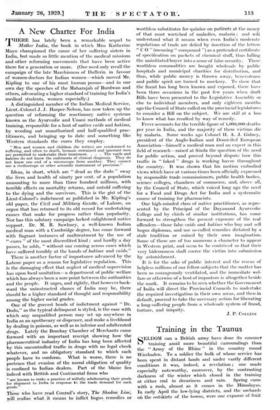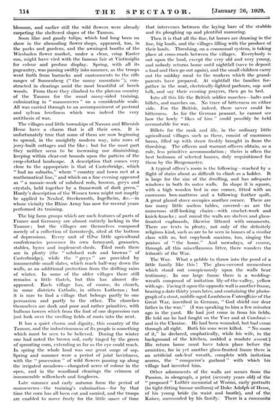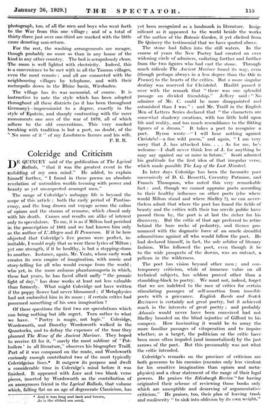Training in the Taunus S ELDOM can a British army have
done its summer training amid more beautiful surroundings than the " Army of the Rhine " in the country round Wiesbaden. To a soldier the bulk of whose service has been spent in distant lands and under vastly different conditions it was, indeed, a revelation ; one made especially noteworthy, moreover, by the contrasting darkness of the winter which closed in the training at either end in dreariness and rain.. Spring came with a rush, almost as it comes in the Himalayas. In early April the low-lying districts, and the orchards On the olitikirts of the towns, were one expanie of frdit blossom, and earlier still the wild flowers were already carpeting the sheltered slopes of the Taunus. - Soon lilac and gaudy tulips, which had long been on show in the abounding flower shops, appeared, too, in the parks and gardens, and the awninged booths of the Wiesbaden flower market, under a clear, crisp Easter sun, might have vied with the famous fair at Vintimiglia for colour and profuse display. Spring, with all its pageantry, was passing swiftly into summer, as the troops went forth from barracks and cantonments to .the rifle ranges of Sonnenberg (" the sunny mountain "); con- structed in clearings amid the most beautiful of beech woods. From there they climbed to the plateau country of the Taunus for the usual many-sided training, culminating in " manoeuvres " on a considerable scale. All was carried through to an accompaniment of pastoral and sylvan loveliness which was indeed the very antithesis of war.
The villages and little townships of Nassau and Rhenish Hesse have a charm that is all their own. It is unfortunately true that some of them are now beginning to spread, in the unsightly modern way, into rows of jerry-built cottages and the like ; but for the most part they neither seem to be increasing nor diminishing, keeping within clear-cut bounds upon the pattern of the crop-clothed landscape. A description that comes very close to the appropriate is that of Casterbridge, which " had no suburbs," where " country and town met at a mathematical line," and which on a fine evening appeared as " a mosaic-work of subdued reds, browns, greys and crystals, held together by a framework of dark green." Hardy's description of the Wessex town might not inaptly be applied to Neuhof, Steckenroth, Ingelheim, &c.—in whose vicinity the Rhine Army has now for several years performed its training.
The big farm groups which are such features of parts of France and Germany are almost entirely lacking in the Taunus ; but the villages are themselves composed merely of a collection of farmstectls, sited at the bottom of depressions. Every unit of tlAse little agricultural confederacies possesses its own farmyard, granaries, stables, byres and implement-sheds. Tiled roofs there are in plenty (the " subdued reds and browns " of Casterbridge), while the " greys " are provided by innumerable small slates, which reach half-way down the walls, as an additional protection from the drifting rains of winter. In some of the older villages there still remains a little thatch, but this has almost dis- appeared. Each village has, of course, its church, in some districts Catholic, in others Lutheran ; but it is rare to find a village that belongs partly to one persuasion and partly to the other. The churches themselves are dark and poor and rather primitive, with bulbous towers which from the foot of one depression can just look over the swelling fields of roots into the next.
It has a quiet charm and dignity, this country of the Taunus, and the industriousness of its people is something which must be seen to be believed. During the winter one had noted the brown soil, early tinged by the green of sprouting corn, extending as far as the eye could reach. In spring the whole land was one great surge of sap. Spring and summer were a period of joint • lavishness, with the " procession " of wild flowers passing up along the irrigated meadows—elongated acres of colour in the open, and in the woodland clearings the crimson of innumerable willowherb and foxgloves.
Late summer and early autumn form the period of manoeuvres—the training's culmination—for by that time the corn has all been cut and carried, and the troops are enabled to move freely -for the little space of time that intervenes between- the laying bare of the stubble and its ploughing up and plentiful manuring.
- Then it is that all the fine, fat horses are drawing in the fine, big loads-, and the villages filling with -the produce of their lands. • Threshing, on -a communal system, is taking place at cross-roads between the villages. Everybody is out upon the land, except the very old- and very young, and nobody returns home until- nightfall (save to • deposit a load and then go out again), and the small children carry out the midday meal " to the workers -which the -grand= parents have prepared. At nightfall the fanailies for.; gather in the neat, electrically-lighted parlours, sup and talk, and say their evening prayers, then go to bed.
Into all this life the British soldier marches—halts and billets, and marches on. No trace of -bitterness on either side. For the British, indeed, there never could be bitterness. As for the German peasant, he cannot see -how the lowly " likes of him " could possibly be held accountable for war.
Billets for the rank and file, in the ordinary little agricultural villages such as these, consist of enormous barns, filled up with straw freshly brought in from the threshing. The officers and warrant-officers obtain, as a rule, less primitive accommodation-; theirs is often the best bedrooni of selectedhonses, duly requisitioned for . _ them by the Burgomaster. .
A typical officer's room is the following—reached, by a flight of stairs about as difficult to climb as a ladder. It is large for the size of the dwelling, and has adequate windows in both its outer walls. In shape it is square, with a high wooden bed in one corner, fitted with an enormous box-mattress and a billowing feather quilt. A great glazed stove occupies another corner. There are too many little useless tables, covered—as are the numerous stiff-looking chairs—with crochet-work and knick-knacks ; and round the walls are shelves and glass fronted cupboards, likewise littered with ornaments. There are texts in plenty, not only of the definitely religious kind, such as are to be seen in houses of a similar class with us, but copybook maxims, too, singing the praises of " the home." And nowadays, of - course, through all this miscellaneous litter, there wanders the leitmotiv of the War.
The War. What a pebble to throw into the pond of a little family like this ! The glass-covered mementoes which stand but conspicuously upon the walls bear testimony. In one large frame there is a wedding- wreath composed of imitation lily-of-the-valley, yellow with age. Facing it upon the opposite wall is another fraMe, bearing a date thirty years later, and containing the photo- graph of a stout, middle-aged Landsturm Unteroffizier of the Great War, inscribed in German, " God shield our dear father in the war." (I was speaking to him a few-minutes ago in the- yard. He had just come in from his fields: He told Me he had fought on the Yser and at Canibrai- and in the Ukraine. - He had been wounded, blithad come through all right. Both- his sons were killed: ."11sIo. more of it," he declared, emphatically, while his wife; in--the background of -the kitchen, nodded .a resolute assent4 His return home -must have taken • place before the armistice, for in yet another glass-fronted frame there is an artificial oak-leaf wreath,- complete with imitation acorns, the - " conqueror's garland " with- which his village had invested him-. • Other adornments of the walls are' scenes fibni the Passion, in oleograph, a print (seventy years old) of the " proposed " Loth& memorial. at •Worthg, early' portraits (in tight-fitting hiiSsar inliforhi)-of Duke Adolph.ef Hesse, of his young bride --(in .:waist -and -bustle), and of the Kaiser, surrounded by his TM-nay:. There is a ebinnoSite photograph, too, of all the Men and boys who went forth Co the War froM this one--village ; and of a total of thirty-three just over one-third are marked with the little cross denoting non-return.
For the rest, the washing arrangements are meagre, though probably no more so than in any house of the kind-in any other country. . The bed is scrupulously clean. The room is well lighted with electricity. Indeed, this is a -convenience to be met with in all the Taunus villages, even the most remote ; and all are connected with the neighbouring villages by telephone, and with their metropolis down in the Rhine basin, Wiesbaden.
The village has its war memorial, of course. It is instructive to note the style- which has been adopted throughout all these districts (as it has been throughout Germany)—impressionist to a degree, exactly in the style of Epstein, and sharply contrasting with the rarer monuments one sees of the war of 1870, all of which adhere to the old conventions. This very marked breaking with tradition is but a part, no doubt, of the `` No more of it " of my Landsturm farmer and his wife.
P. R. B.










































 Previous page
Previous page